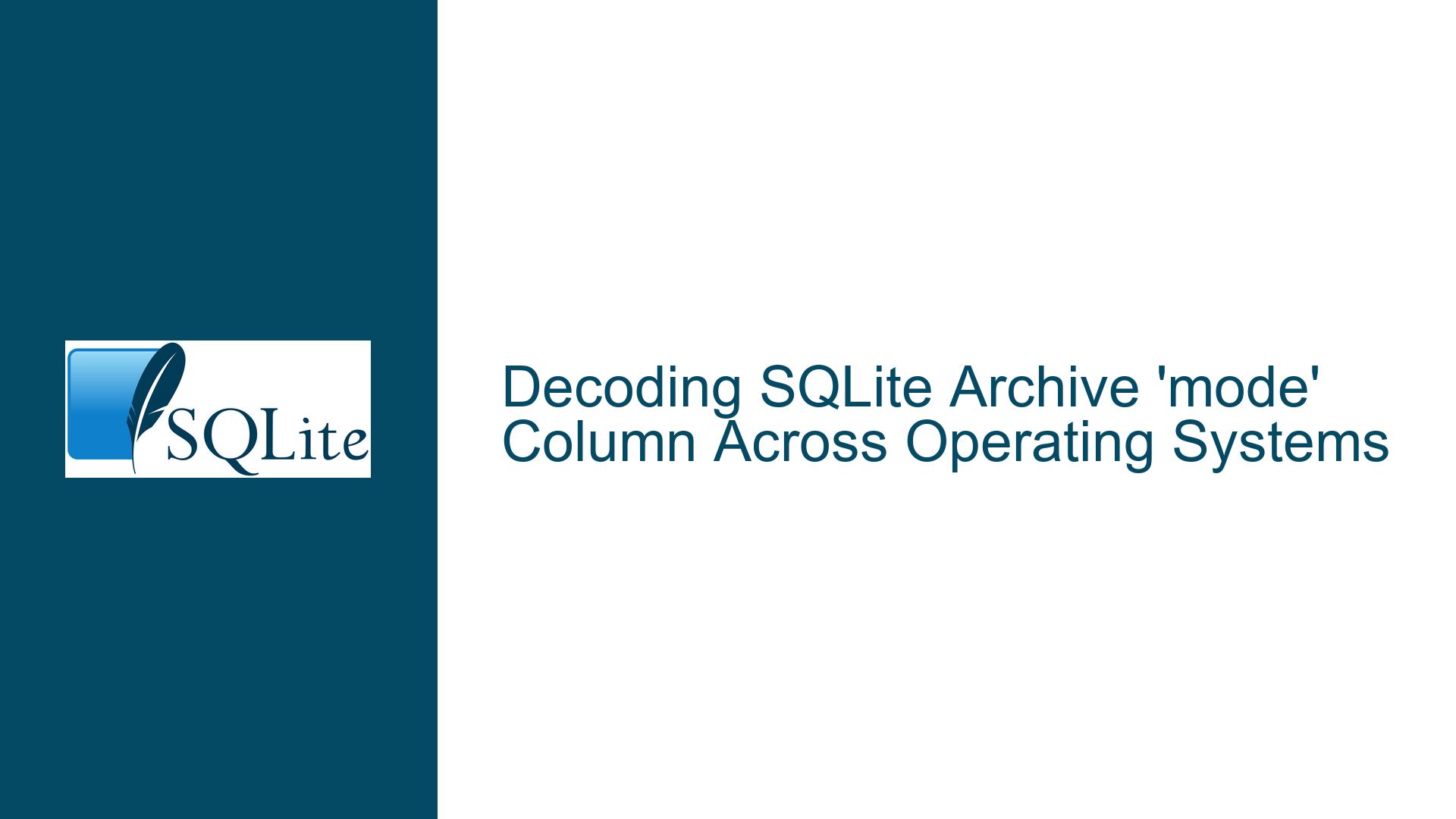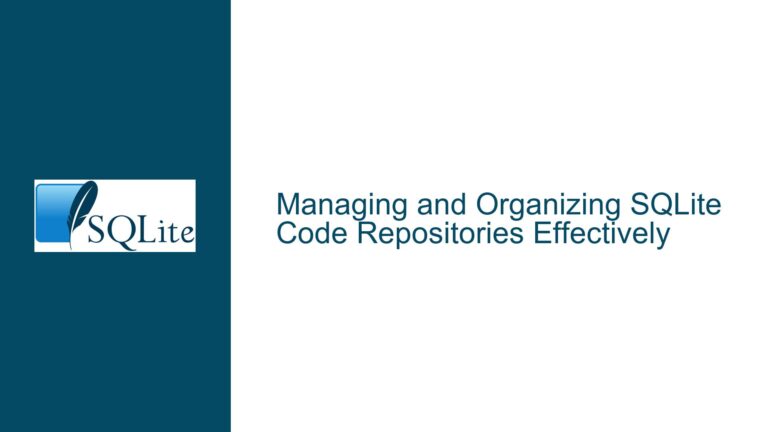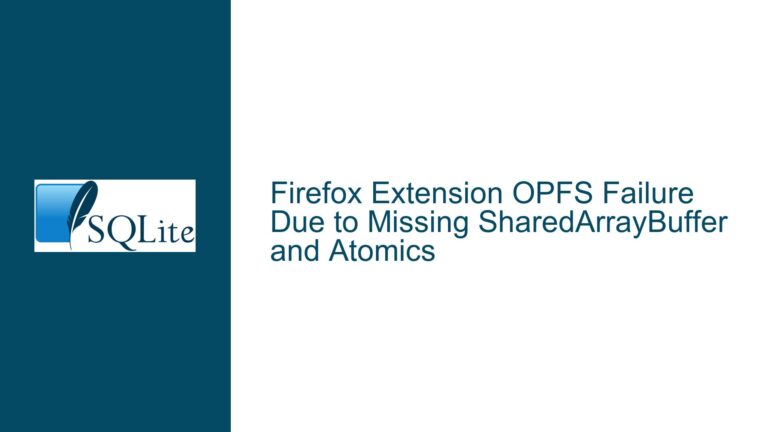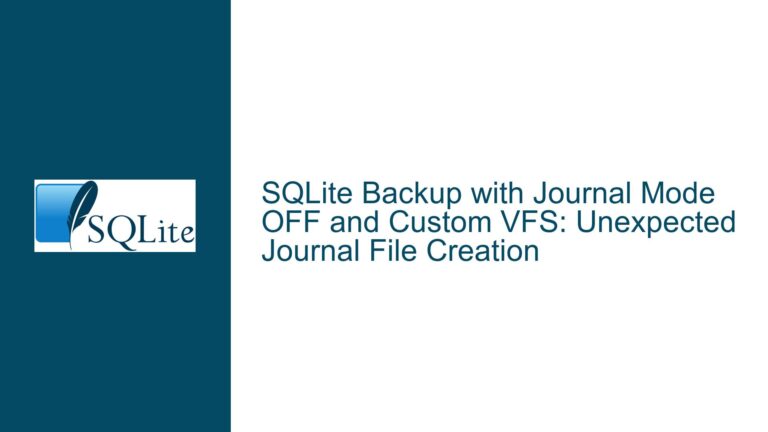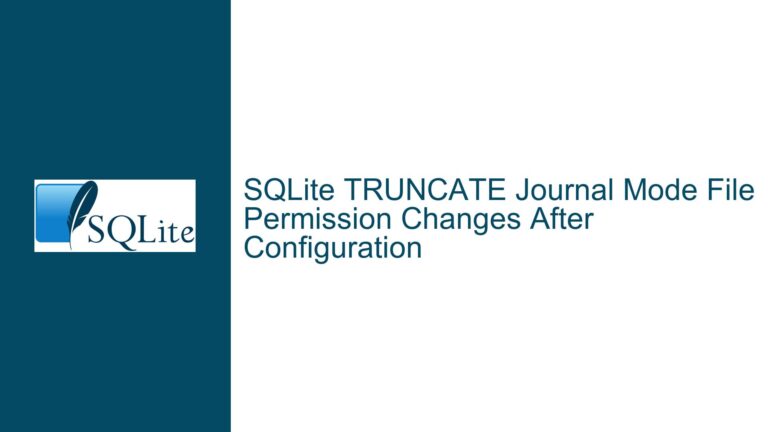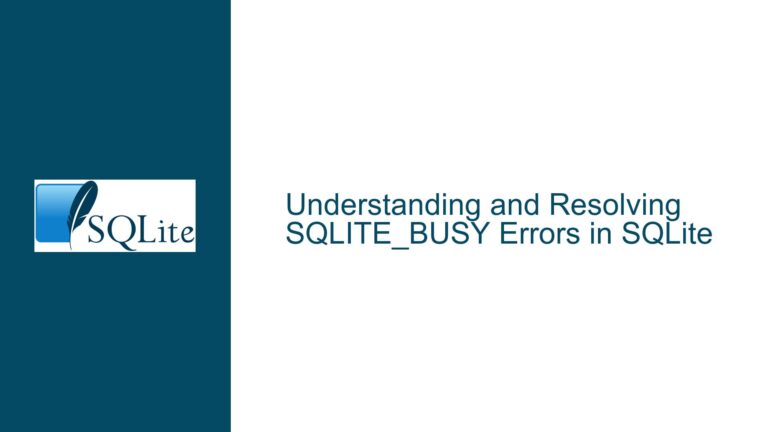Decoding SQLite Archive ‘mode’ Column Across Operating Systems
Understanding the SQLite Archive ‘mode’ Column and Cross-OS Compatibility Challenges
The SQLite Archive format (SQLAR) is designed to store filesystem hierarchies in a portable SQLite database. A critical component of this format is the mode column in the sqlar table, which captures file metadata such as permissions and type (regular file, directory, etc.). This column stores a 32-bit integer representing file mode bits derived from the host operating system’s file metadata structure. The challenge arises when attempting to interpret this integer across operating systems due to differences in how these bits are defined and masked.
On Unix-like systems (Linux, macOS, BSD), the mode value combines permission flags (read/write/execute bits for user/group/others) with file type identifiers using bitwise operations. For example, the S_IFMT mask isolates the file type portion of the mode, while S_IFDIR and S_IFREG represent directory and regular file types respectively. macOS uses the same fundamental bit definitions as other Unix systems but may include extended attributes or platform-specific flags in higher-order bits. Windows, however, does not natively use Unix-style permission bits. When SQLite creates an SQLAR file on Windows, the mode column’s contents depend on how the SQLite binary was compiled and whether it emulates Unix-like permissions.
Go’s io/fs.FileMode abstraction complicates this further. While portable in theory, Go’s implementation remaps OS-specific mode bits to a simplified representation. For instance, Go defines fs.ModeDir (a single bit at position 1 << 31) to represent directories, whereas Unix systems use S_IFDIR (value 0x4000) masked with S_IFMT (value 0xf000). This mismatch means direct bitwise comparison between raw mode values and Go’s FileMode constants will fail unless explicit translation occurs. The core problem is that SQLAR’s mode column is not guaranteed to be portable unless the decoding logic accounts for these OS-specific and language-specific mappings.
Root Causes of ‘mode’ Column Decoding Discrepancies in SQLite Archives
The root cause of decoding failures lies in three areas: (1) operating system divergence in defining file type bits, (2) abstraction mismatches between Go’s FileMode and native OS mode values, and (3) SQLite’s reliance on host OS behavior when populating the mode column. On Unix systems, the mode integer includes the full stat.st_mode value, which combines permissions and file type using bitmasks like S_IFMT. For example, a directory’s mode on Unix might be 0o40755, where the 0o40000 portion corresponds to S_IFDIR. Go’s FileMode splits these into separate flags: fs.ModeDir for the directory type and lower bits for permissions. Windows does not have native stat.st_mode equivalents, so SQLite may populate the mode column with synthesized values. If the SQLite3 binary on Windows is compiled with compatibility layers (e.g., MinGW or Cygwin), it might emulate Unix-style modes. Otherwise, it might default to basic permission flags (e.g., 0o666 for files) without file type differentiation.
Another critical factor is the lsmode function provided by SQLite’s shell extension. This function converts the mode integer into a human-readable string resembling Unix ls -l output (e.g., drwxr-xr-x). However, lsmode relies on the same host OS’s definitions of mode bits. If an SQLAR file created on macOS is read on Windows using a SQLite shell without Unix emulation, lsmode may misinterpret the high-order bits, leading to incorrect type or permission strings. This makes lsmode unreliable for cross-platform use unless all interacting systems share the same mode bit semantics.
Strategies for Reliable ‘mode’ Column Interpretation and Cross-Platform Compatibility
To reliably decode the mode column across operating systems, implement a two-stage process: (1) isolate file type bits using platform-agnostic masks and (2) map these bits to Go’s FileMode constants. Start by defining constants for Unix file type masks and comparing them against Go’s syscall package values. For example, use syscall.S_IFMT to extract the file type portion of the mode. Then, check against syscall.S_IFDIR and syscall.S_IFREG to determine if the entry is a directory or regular file. These constants are consistent across Unix-like systems, including macOS. Convert the result to Go’s FileMode by setting fs.ModeDir for directories and using permission bits directly (e.g., mode & 0o777).
For Windows compatibility, assume that SQLite archives created on Windows may lack proper file type differentiation. If the mode value does not include valid S_IFDIR/S_IFREG bits, infer the file type from the name column (e.g., trailing slashes for directories). However, this is error-prone and not universally supported. A better approach is to use SQLite’s sqlar_uncompress function, which writes a "size" of 0 for directories, but this is not standardized. Instead, combine both strategies: check for S_IFDIR first, then fall back to size and name heuristics if the mode bits are ambiguous.
When working with Go, directly map the isolated Unix file type bits to FileMode using bitwise operations. For example:
mode := sqlarMode // Assume this is the integer value from the 'mode' column
fileType := mode & syscall.S_IFMT
var fileMode fs.FileMode
switch fileType {
case syscall.S_IFDIR:
fileMode |= fs.ModeDir
case syscall.S_IFREG:
// Default, no flag needed for regular files
default:
// Handle other types (sockets, symlinks) if necessary
}
fileMode |= fs.FileMode(mode & 0o777) // Add permission bits
For cross-platform archives, always validate the decoding logic against SQLAR files created on different OSes. Test cases should include directories and files with varying permissions from macOS, Linux, and Windows (if applicable). If Windows-generated SQLAR files do not set S_IFDIR, consider extending the library to accept a manual override flag or metadata table indicating the originating OS. This allows conditional logic to switch decoding strategies based on the archive’s provenance.
Finally, avoid relying on SQLite’s lsmode function for programmatic decisions. Instead, use direct bitwise operations and platform-specific constants. If the archive will be used in heterogeneous environments, document the limitations of the mode column and recommend supplemental metadata (e.g., a separate column for file type) for critical applications. By combining bitmask isolation, OS-specific fallbacks, and rigorous cross-testing, SQLite Archive mode values can be decoded accurately across operating systems.
